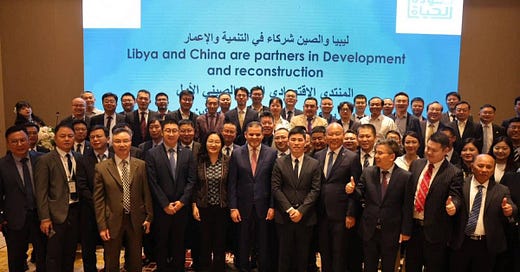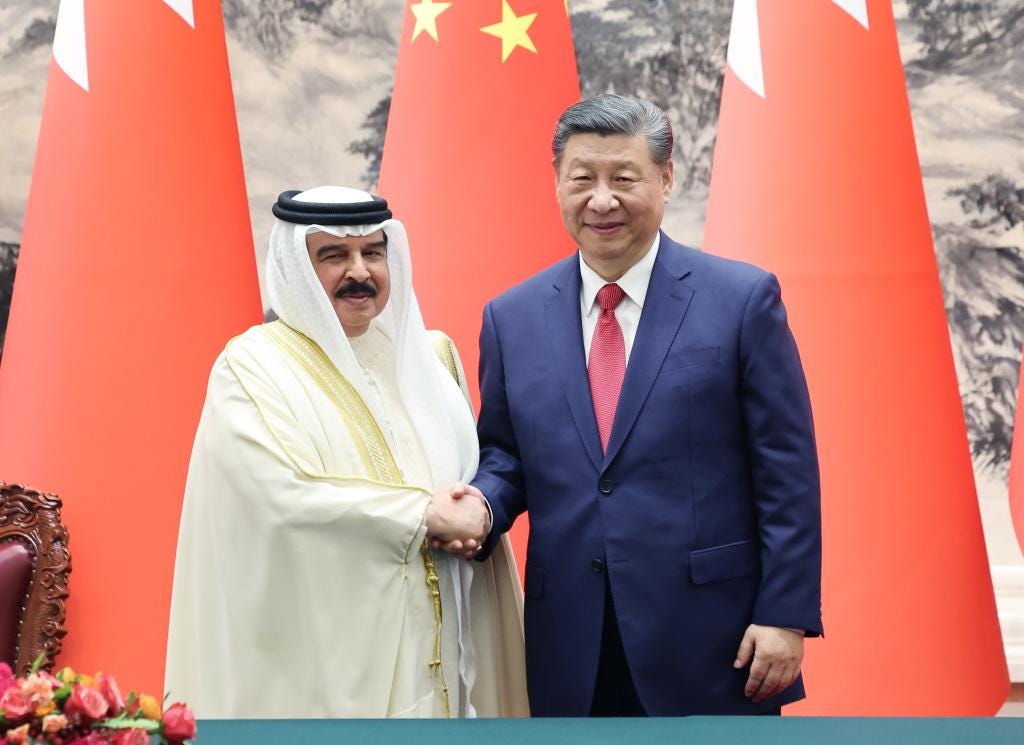Partnerships for Bahrain and Tunisia, China-UAE security cooperation, Libya-China economic forum
I wasn’t planning to post today but there’s still a lot of stories coming out in the wake of the CASCF, so trying to stay on top. With the CASCF over, my first impression is that there were fewer big announcements than I was expecting. A Chinese participant in some of the affiliated meetings told me that he thinks there’s a fatigue among Arab governments in signing endless empty MoUs with China. I suspect there’s some truth to that. The big takeaway obviously was the Gaza crisis and China’s positioning of itself in alignment with how it seems to think the ‘Arab World’ sees this.
Partnership agreements (see below) give the impression of more high-level diplomacy across the region, but a lot of these look like box-ticking. Frankly, so many Chinese strategic partnerships in MENA are quite dormant and just having one seems like the point. I’ll write an essay about this soon. I do think the meetings with the Libyan delegation is interesting. China-North Africa is something I’ve been giving a lot more thought to lately.
China, Bahrain establish comprehensive strategic partnership - Xinhua. Bahrain finally gets its partnership agreement with China. It has been the lone Gulf country without one, and I figured the King’s trip would result in this; state visits to China have often resulted in a partnership or a partnership upgrade. Shocked, actually, that it’s a comprehensive strategic partnership - this is the highest level China has in MENA. For context, Saudi Arabia, Iran, UAE, Egypt and Algeria were the only Middle Eastern countries with a CSP, while 10 other regional countries have strategic partnerships, the next level down. Given Bahrain’s market size and its relatively modest level of engagement with China this is puzzling to me.
China-Bahrain Cooperation: CGTN interview with director general of bilateral relations at Bahrain's Foreign Ministry - CGTV. A bit of context from Bahrain.
China, Tunisia establish strategic partnership -Xinhua. Same logic as above; seems Beijing is trying to complete the set of partnership agreement with Arab League countries. By my count, the Arab League countries that done have one: Comoros, Lebanon, Libya, Mauritania, Somalia, Sudan, and Yemen. Most can be explained by political and/or security problems. Tunisia and Bahrain could have been explained by inertia. That Tunisia is a strategic partner and Bahrain is a comprehensive strategic partner is odd and I’ll be looking into it.
China, UAE ready to trade defence and security experiences - Reuters. I suspect this one will raise some eyebrows but on its own, not much to it:
China and the United Arab Emirates have emphasised a readiness to exchange experiences on defence and security, with a view to upgrading capacities of military personnel and security institutions in both countries, China's foreign ministry said on Sunday.
Momentum on the China-Libya front, which has been pretty quiet since the PRC had to evacuate nearly 36,000 citizens in 2011.
Dbeibah Stresses China’s Important Role in Reconstructing Libya - Asharq Al-Awsat. This says there are 23,000 Chinese working in Libya right now, which is a lot more than I would have thought.
Head of Libya’s interim Government of National Unity (GNU) Abdulhamid al-Dbeibah called on Chinese companies to complete their suspended projects in his country, underlining Beijing’s role in the reconstruction process underway in Libya.
Dbeibah inaugurates the first Libyan-Chinese Economic Forum in Beijing _ The Libya Observer. Coverage of the same event as the story above. Says representatives from 84 Chinese companies attended.
According to a statement issued by the Prime Minister’s Media Office, Dbeibah stressed the need to focus on resuming suspended Chinese firms' projects in Libya, and considering this resumption the first stage of joint cooperation.
Why Is Libyan Prime Minister And Chinese Foreign Minister Discussing Activation Of 18 Agreements At This Time? Eurasian Review. An op-ed that gives an overview of the bilateral relationship in the context of this meeting in Beijing.
China is poised to activate the 18 agreements signed between the two countries. This includes facilitating the return of Chinese companies to complete projects in Libya, participating in the country’s reconstruction efforts, and exploring opportunities for prisoner exchanges.





